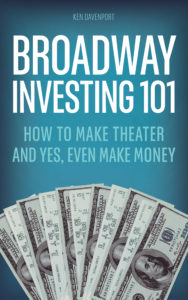
A Conversation on Investing…
Mar 15, 2019

~Conversation has been edited and abbreviated for clarity~
1. What was the primary impetus for writing this book?

Broadway has become hot these days with the success of shows like Dear Evan Hansen, Hamilton, and the NBC Telecasts. We’ve gotten international attention. I’ve found that there’s more people interested in investing in Broadway shows than ever before. I talk to a lot of these people because of my blog and because I speak at many events. The rise in potential investors is exciting for our industry, but I found there were a lot of questions. I wanted to make sure that people entered this world armed with the right information so that they didn’t make mistakes and then run away from us very quickly. I think that our business has been a bit of a gated community for many years and part of my mission is to bring down those walls a little bit. This book is one of those tools.
2. You mention in your book that you posted about seeking investors for Godspell on your blog, which prompted a flood of responses. How did you handle the high volume of inquiries?
I made it a rule of mine that I would talk to every single person. I believe that investing in the theater is high risk, and people need to understand the risk and have the right expectations before they invest. I think that when someone gets upset about an investment that doesn’t work out (whether it’s on Broadway or in the stock market), it indicates that they had the wrong expectations going in and didn’t understand the risks involved.
3. Because you believe in Broadway investing being more inclusive, you set your minimum investments at relatively low values. What techniques do you use to handle the high volume of investors?
It’s all about communication, there’s no question. I try to communicate as much as possible so that I can answer questions. I also do live events at times. For Godspell, I had shareholder meetings every quarter. I invited our investors to the theater, gave them an update, and usually had someone else involved in the show speak as well – the director, the advertising executive, etc… It’s about providing the experience of investing as well as the dollars and cents.
4. Aside from posting on your blog, how do you find your investors?
Posting on the blog was something unique for Godspell because you can’t legally just post a note anywhere seeking investors. The blog pointed readers to the “People of Godspell” website, which had all the information about investing. That was a different type of offering, however, and it required a lot more regulation than regular investments. So, if I started raising money for my next new musical I wouldn’t just post on my blog.
Most investments come from word of mouth, referrals, or people reaching out to learn more about my company and future projects.
5. In your book, you suggest that there be an alternative method to determining who legally can and can’t invest in a Broadway production. What ideas do you have in mind?
The closest solution I can come up with is what I call a “Stress Test for Investors” which would not only examine the financial situation of the potential investor but also their understanding of the risk involved. I do think our legal paperwork right now does a good job of explaining the high risk of investing, but I think a very simple ten-question checklist would be useful. It would ask things like, “Do you understand that you may lose every dollar of your investment?” or “If you do lose this investment, will you be able to maintain your living expenses?”. The test would simply reinforce that people understand the expectations. I think this is one way in which we could allow more people to get involved.
6. In your experience, what’s been the key to maintaining a lasting relationship with your investors?
Communication. I did a survey that found that the majority of investors weren’t disappointed when they lost money, but were disappointed if they didn’t know they were losing money. It’s about being honest. It’s a hard thing to do because no one likes to admit that things aren’t going so well, but you have to do it. That’s the key to long-term relationships for sure.
7. I appreciated the point you made about one of the primary challenges of selling a Broadway show; It’s a “non-essential” purchase, and you somehow have to make it a “must” product. What advice do you have in achieving this goal?
Well most of those things that become “must haves” are the result of word of mouth making them hotter than anything else. Be More Chill is a great example. It had tons of buzz and every teenager needed to experience it live. Another is the Amazon Coat – one of the hottest selling coats on Amazon. It’s a women’s coat with tons of pockets and is warm and inexpensive. It started selling so quickly that news articles were being written about it. The word-of-mouth had taken off and sales heated up so much that it started to affect press, which got even more people talking about the coat, which in turn increased already significant sales. That’s when things become a must-have. So, it’s really word-of-mouth – there’s not much more you can do. You can’t advertise that kind of heat. I always say that advertising to achieve that level of market penetration is just like screaming at someone to buy something, and they’re not going to do that. They’re going to wait until their friends say, “You gotta go see this show!” or “You have to get this coat!”.
8. Could a review help or hurt that word-of-mouth?
What I always find is that reviews are steroid shots to word-of-mouth and to a show’s life. If a show gets good reviews when it opens, ticket sales will spike, but they won’t stay up there unless word-of-mouth is good. So, a good review often will get a show through the period before their word-of-mouth has really hit.
9. You note in your book that for new productions, it’s important that the show be the star, rather than the show rely on a star. This may seem counter-intuitive to some of our readers. Can you elaborate on why this is an important consideration to make when selecting projects in which to invest?
I’m a big data guy, and if you look at the ten longest running musicals of all time, only Chicago had a star in it when it opened. However, it was a revival, which puts it in a somewhat different category, and had Broadway stars, not Hollywood celebrities. The key to long-term success is finding shows that will resonate over decades. You can’t be dependent on the star like a movie. The Godfather will have Marlon Brando in it for the rest of eternity. Phantom will not have Michael Crawford in it for the rest of eternity, but that show is so good and resonant that it doesn’t matter.
10. So what makes a show resonate?
That’s the secret sauce. I find my next projects by picking shows that I want to see, things that really resonate with me. I think I have a pretty good finger on the pulse of what the public wants to see because, frankly, that’s usually what I want to see. I think my tastes are generally aligned with the majority of Broadway audiences. I’m a theater fan at the end of the day. You can call me a producer, but I’m a theater fan, so I chose shows that satisfy that sixteen-year-old kid in me that drove in from Massachusetts wanting to see musicals.

11. How do you find your next project? Do you solicit scripts, come up with ideas on your own, attend tons of readings…?
Yes to all those things. There’s no sure-fire method to finding a show. Your eyes and ears have to be open all the time. Sometimes I come up with ideas for shows of my own. I thought there was a musical in the Vacation movie franchise so I’m developing Broadway Vacation. My stock broker asked if I had ever considered a musical about Joy Mangano, so now I’m working on that. Once on This Island was pitched to me by Michael Arden. So, my projects come to me in a variety of different ways.
12. You explain in your book that the success of a show often depends on whether it resonates now. Looking at this year’s season, is there a specific genre, topic, theme, or issue you think is missing on Broadway?
Well, Broadway has always been about adaptation, so I’m not going to say we’re missing new original musicals because there really never are that many of them. But I will say that we are very heavy on big brands right now. I think we’re over-weighted in big brands, where the emphasis is placed on a brand that makes a musical rather than a great story that makes a musical. I think there have been some choices to produce shows because there’s a built-in audience, not because the material is perfectly suited for a theatrical adaptation.
13. I’ve noticed more and more undergraduates attending CTI courses and complaining about a lack of producing education at the university level. As an NYU Tisch graduate yourself, why do you think this is, and what advice do you have for these undergrads?
It’s a real challenge and it’s a real mission of mine to start to get institutions around the country and the world (including high schools) to establish the concept that being a producer is a career, not just a hobby. I think schools don’t want to teach producing because it’s entrepreneurial and relies on raising money. The success of raising money is dependent on the individual. For now, I think the best undergrads can do is try to learn a little bit of everything. The most successful producers out there are the ones that can speak the language of the writer, director, designer, and actor. When you can really get into that mix and talk, listen, and understand, you can create something great. And when you create something great, money will come to you.